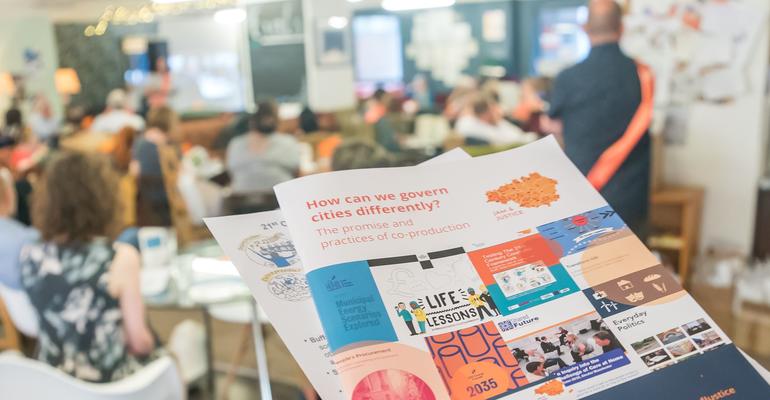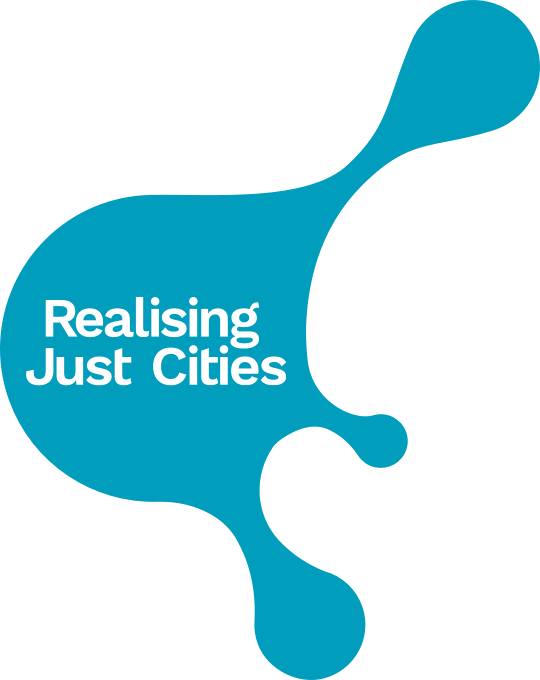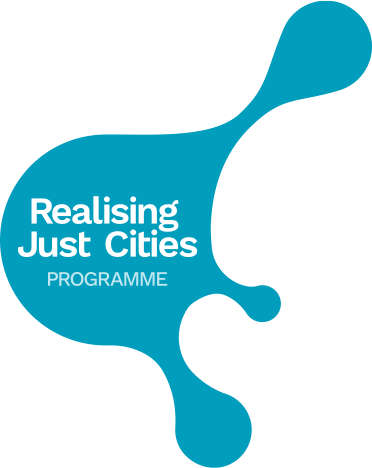Report launch: How can we govern cities differently?

More than sixty people gathered at the Ziferblat event space in Manchester’s Northern Quarter to celebrate the publication of the report, How can we govern cities differently? The promise and practices of co-production.
The evening programme included opportunities to hear about the different projects co-initiated by Jam & Justice’s Action Research Collective and chat with members of the Action Research Collective. Catherine Durose welcomed everyone; Beth Perry presented highlights from the key findings; and Liz Richardson chaired a short question-and-answer session as well as introducing three guest speakers.
A brief run-down of the report contents can be found here. A copy of the main presentation can be downloaded here, and the report and a wider set of Jam and Justice’s publications are all available to download on our publications page.
So what did our guests have to say?
Anne Lythgoe, VCSE Accord Lead, Greater Manchester Combined Authority
Jam and Justice has provided space to take difficult issues outside the pressures and conditions of the day job, and work with different sorts of experts whether technical, community, VCSE, or academic. No matter what the basis of individual expertise, we have been able to discuss difficult issues together with respect and confidence.
Watching the People’s Republic of Energy video this evening, I picked up the word “re-imagining”. Jam and Justice has provided the space to do that, to put away existing conceptions in order to think and rethink areas where we otherwise presumed there was no other option available. ...the experience of visiting and hearing people speak directly about their experiences has been better than any formal training offer. […]
One of the points brought out in Jam & Justice’s report is that people and relationships make change. This plugs in with where we’re at in Greater Manchester, exploring the role of cooperatives and community-led enterprises, and how we can help them grow and flourish.
So where do we go from here? My involvement in the People’s Procurement ARC project provides an example of moving forward together, as stakeholders introduced through that project have continued to work cross-sector to create a new Social Value-led approach to procurement policy.
At a practical level, if it were not for this kind of intentional cross-sector working, I wouldn’t be here. My role as VCSE Accord lead is to deliver the joint partner agreement signed between organisations including the Combined Authority and the VCSE sector. I don’t know another area that is making such agreements, or where sectors are starting to work at the same level. It is becoming the Greater Manchester norm and that is to be celebrated.
Maddy Hubbard, Co-Production Project Manager, Greater Manchester Health & Social Care Partnership
I work within the Person- and Community-Centred Approaches team, a team whose existence marks an intentional shift in the culture of Health and Social Care—to orient our work around what matters to people and communities. … There’s a long history of working on co-production within the Health and Social Care world, and I can see good things emerging as a result. [...]
What I found in Coalitions for Change was a space for strategic conversation, to think collectively about what levers we need to pull and create space for people to get on and do it. Jam and Justice has given me the capacity to make connections to a bigger picture. Equally, these connections have given me confidence as I go out to talk with localities about their work with citizens. I felt as though Coalitions for Change provided allies and collaborators. We can know intellectually what’s needed to drive co-production forward, but having someone to take the leap of faith with matters too. I have been able to take more risks because I have felt part of something bigger. I found a new sense of bravery, and made connections with people I could not have met in the same way, across sectors, and across the city region.
Jam and Justice gave me space and permission to push stuff further, to ensure co-production is more than a buzzword and form a vision of what’s possible, driven by values of justice. I have also valued the level of nuance that it is possible to attain when stepping away from my day-to-day work. The ability to take an idea, take it apart, and put it back together.
Another key value I see in Jam and Justice’s work is in building an evidence base. While some people automatically ‘get’ co-production, there are others who are more sceptical or who you need to appeal to in different ways – minds as well as hearts. The ethos of testing and learning gives support to our work.
I am keen to ensure that these spaces to continue. In the years ahead, perhaps something to hope for is that people may not remember or recognise “Jam and Justice” but the ways of being and doing advocated through this work will simply be how we do things in “our city”.
Nicola Headlam
I first saw Jam & Justice on paper as a funding bid, one of 11 that had been shortlisted for consideration. At the time I commented to another decision-maker that the proposal was great, and it was a shame it wouldn’t be funded. I was not sure the world was ready for this kind of work. I am happy to have been wrong. As they say, “success has many mothers, but failure is an orphan”.
Looking around, I find that the work has genuinely shifted conversation. … How fantastic that this celebration today is more engaged than the project’s original launch [at the People’s History Museum, back in May 2016]. This is remarkable: everyone is enthused on the wedding day, but few arrive at the 25th Anniversary party with quite such energy. Keeping the gang together through the project is a real achievement…
[Having recently completed work writing strategy for the Northern Powerhouse] I am free to think about the spaces for hope in sub-national government. And my challenge to self now is to help to distil Jam & Justice’s message in a way that can be heard at the centre. Because my sense is that the space for thinking quite differently is opening up... [T]hinking about how you manage to energise people to think and talk about cities is back in a big way. Civil servants are no longer taking the view that “we know best” nor will they hide away only popping out occasionally. If the government does not know best, then who does? The result is authentic co-production.
Members of the Jam & Justice Action Research Collective, pictured at the report launch on Wednesday 3 July. (Photograph: Jason Lawton for Jam & Justice.)




